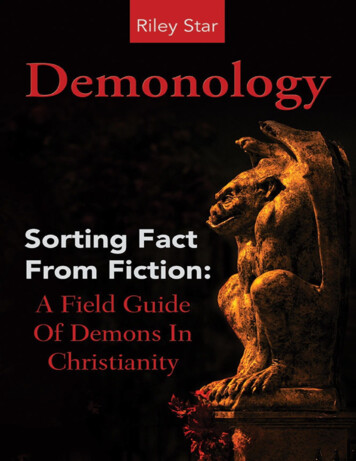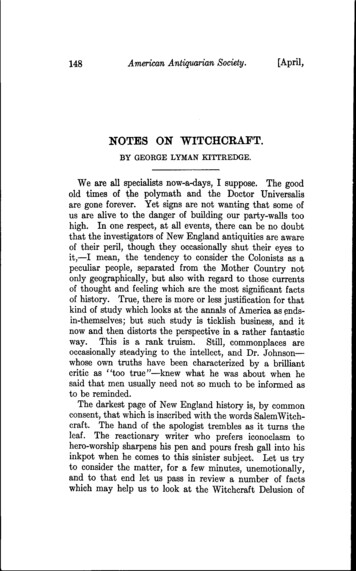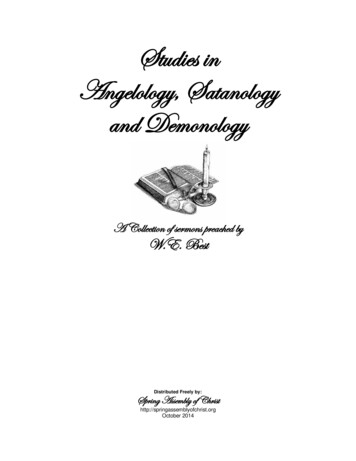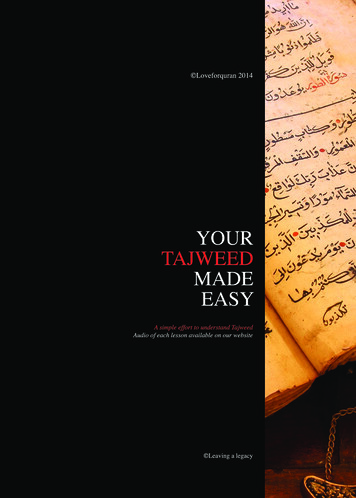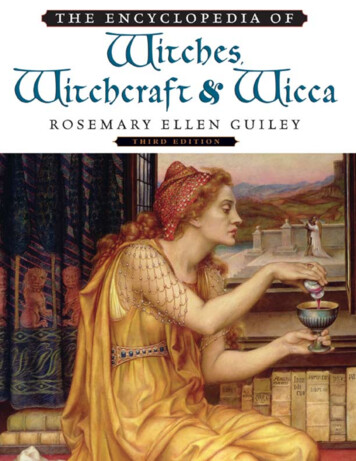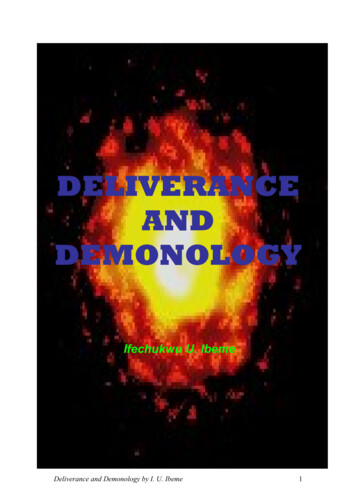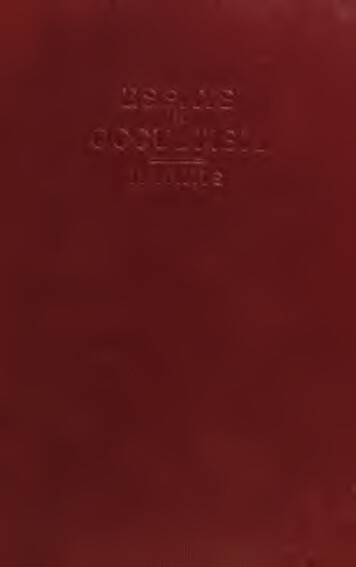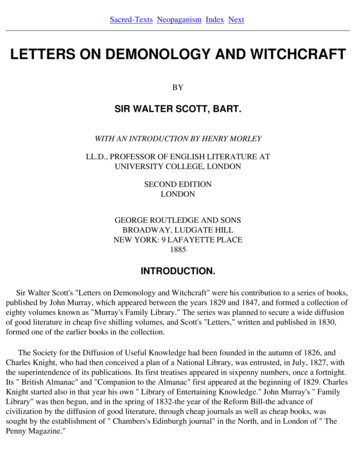
Transcription
Sacred-Texts Neopaganism Index NextLETTERS ON DEMONOLOGY AND WITCHCRAFTBYSIR WALTER SCOTT, BART.WITH AN INTRODUCTION BY HENRY MORLEYLL.D., PROFESSOR OF ENGLISH LITERATURE ATUNIVERSITY COLLEGE, LONDONSECOND EDITIONLONDONGEORGE ROUTLEDGE AND SONSBROADWAY, LUDGATE HILLNEW YORK: 9 LAFAYETTE PLACE1885INTRODUCTION.Sir Walter Scott's "Letters on Demonology and Witchcraft" were his contribution to a series of books,published by John Murray, which appeared between the years 1829 and 1847, and formed a collection ofeighty volumes known as "Murray's Family Library." The series was planned to secure a wide diffusionof good literature in cheap five shilling volumes, and Scott's "Letters," written and published in 1830,formed one of the earlier books in the collection.The Society for the Diffusion of Useful Knowledge had been founded in the autumn of 1826, andCharles Knight, who had then conceived a plan of a National Library, was entrusted, in July, 1827, withthe superintendence of its publications. Its first treatises appeared in sixpenny numbers, once a fortnight.Its " British Almanac" and "Companion to the Almanac" first appeared at the beginning of 1829. CharlesKnight started also in that year his own " Library of Entertaining Knowledge." John Murray's " FamilyLibrary" was then begun, and in the spring of 1832-the year of the Reform Bill-the advance ofcivilization by the diffusion of good literature, through cheap journals as well as cheap books, wassought by the establishment of " Chambers's Edinburgh journal" in the North, and in London of " ThePenny Magazine."
In the autumn of that year, 1832, on the 21st of September, Sir Walter Scott died. The first warningof death had come to him in February, 1830, with a stroke of apoplexy. He had been visited by an oldfriend who brought him memoirs of her father, which he had promised to revise for the press. Heseemed for half an hour to be bending over the papers at his desk, and reading them; then he rose,staggered into the drawing-room, and fell, remaining speechless until he had been bled. Dieted forweeks on pulse and water, he so far recovered that to friends outside his family but little change in himwas visible. In that condition, in the month after his seizure, he was writing these Letters, and also afourth series of the "Tales of a Grandfather." The slight softening of the brain found after death had thenbegun. But the old delight in anecdote and skill in story-telling that, at the beginning of his career, hadcaused a critic of his " Border Minstrelsy" to say that it contained the germs of a hundred romances, yetsurvived. It gave to Scott's " Letters on Demonology and Witchcraft" what is for us now a patheticcharm. Here and there some slight confusion of thought or style represents the flickering of a light thatflashes yet with its old brilliancy. There is not yet the manifest suggestion of the loss of power that wefind presently afterwards in " Count Robert of Paris" and " Castle Dangerous," published in 1831 as theFourth Series of " Tales of My Landlord," with which he closed his life's work at the age of sixty.Milton has said that he who would not be frustrate of his hope to write well in laudable things, oughthimself to be a true poem. Scott's life was a true poem, of which the music entered into all he wrote. If inhis earlier days the consciousness of an unlimited productive power tempted him to make haste to berich, that he might work out, as founder of a family, an ideal of life touched by his own genius ofromance, there was not in his desire for gain one touch of sordid greed, and his ideal of life only broughthim closer home to all its duties. Sir Walter Scott's good sense, as Lord Cockburn said, was a morewonderful gift than his genius. When the mistake of a trade connection with James Ballantyne broughtruin to him in 1826, he repudiated bankruptcy, took on himself the burden of' debt of 130,000, andsacrificed his life to the successful endeavour to pay off all. What was left unpaid at his death wascleared afterwards by the success of his annotated edition of his novels. No tale of physical strife in thebattlefield could be as heroic as the story of the close of Scott's life, with five years of a death-struggleagainst adversity, animated by the truest sense of honour. When the rum was impending he wrote in hisdiary, " If things go badly in London, the magic wand of the Unknown will be shivered in his grasp. Thefeast of fancy will be over with the feeling of independence. He shall no longer have the delight ofwaking in the morning with bright ideas in his mind, hasten 'to commit them to paper, and count themmonthly, as the means of planting such scaurs and purchasing such wastes; replacing dreams of fictionby other prospective visions of walks by'Fountain-heads, and pathless groves;Places which pale passion loves.'This cannot be; but I may work substantial husbandry i.e., write history, and such, concerns." It wasunder pressure of calamity like this that Sir Walter Scott was compelled to make himself known as theauthor of "Waverley." Closely upon this followed the death of his wife, his thirty years' companion. "Ihave been to her room," he wrote in May, 1826; "there was no voice in it no stirring; the pressure of thecoffin was visible on the bed, but it had been removed elsewhere; all was neat as she loved it, but all was
calm-calm as death. I remembered the last sight of her: she raised herself in bed, and tried to turn hereyes after me, and said with a sort of smile, 'You have all such melancholy faces.' These were the lastwords I ever heard her utter, and I hurried away, for she did not seem quite conscious of what she said;when I returned, immediately departing, she was in a deep sleep. It is deeper now. This was but sevendays since. They are arranging the chamber of death-that which was, long the apartment of connubialhappiness, and of whose arrangement (better than in richer houses) she was so proud. They are treadingfast and thick. For weeks you could have heard a footfall. Oh, my God!"A few years yet of his own battle, while the shadows of night and death were gathering about him,and they were re-united. In these "Letters upon Demonology and Witchcraft," addressed to his son-inlaw, written under the first grasp of death, the old kindliness and good sense, joined to the old charm instory-telling, stand firm yet against every assault; and even in the decay that followed, when the powerswere broken of the mind that had breathed, and is still breathing, its own health into the minds of tens ofthousands of his countrymen, nothing could break the fine spirit of love and honour that was in him.When the end was very near, and the son-in-law to whom these Letters were addressed found him onemorning entirely himself, though in the last extreme of feebleness: his eye was clear and calm-everytrace of the wild fire of delirium was extinguished: "Lockhart," he said, "I may have but a minute tospeak to you. My dear, be a good man--be virtuous, be religious--be a good man. Nothing else will giveyou any comfort when you come to lie here."Another volume of this Library may give occasion to recall Scott in the noontide of his strength,companion of"The blameless Muse who trains her sonsFor hope and calm enjoyment."Here we remember only how from among dark clouds the last light of his genius shone on the path ofthose who were endeavouring to make the daily bread of intellectual life-good books-common to all.H. M.February, 1884
Sacred-Texts Neopaganism Index Previous NextLETTERSonDEMONOLOGY AND WITCHCRAFTTo J. G. LOCKHART, Esq.LETTER I.Origin of the general Opinions respecting Demonology among Mankind -- The Beliefin the Immortality of the Soul is the main inducement to credit its occasional reappearance -- The Philosophical Objections to the Apparition of an Abstract Spirit littleunderstood by the Vulgar and Ignorant -- The situations of excited Passion incident toHumanity, which teach Men to wish or apprehend Supernatural Apparitions -- They areoften presented by the Sleeping Sense -- Story of Somnambulism -- The Influence ofCredulity contagious, so that Individuals will trust the Evidence of others in despite oftheir own Senses -- Examples from the "Historia Verdadera" of Bernal Dias del Castillo,and from the Works of Patrick Walker -- The apparent Evidence of Intercourse with theSupernatural World is sometimes owing to a depraved State of the bodily Organs -Difference between this Disorder and Insanity, in which the Organs retain their tone,though that of the Mind is lost -- Rebellion of the Senses of a Lunatic against the currentof his Reveries -- Narratives of a contrary Nature, in which the Evidence of the Eyesoverbore the Conviction of the Understanding Example of a London Man of Pleasure -Of Nicolai, the German Bookseller and Philosopher -- Of a Patient of Dr. Gregory -- Ofan Eminent Scottish Lawyer, deceased -- Of this same fallacious Disorder are otherinstances, which have but sudden and momentary endurance -- Apparition of Maupertuis-- Of a late illustrious modern Poet -- The Cases quoted chiefly relating to falseImpressions on the Visual Nerve, those upon the Ear next considered -- Delusions of theTouch chiefly experienced in Sleep -- Delusions. of the Taste -- And of the Smelling -Sum of the Argument.You have asked of me, my dear friend, that I should assist the "Family Library" with the history of adark chapter in human nature, which the increasing civilization of all well-instructed countries has nowalmost blotted out, though the subject attracted no ordinary degree of consideration in the older times oftheir history.Among much reading of my earlier days, it is no doubt true that I travelled a good deal in the twilightregions of superstitious disquisitions. Many hours have I lost -- "I would their debt were less !" -- inexamining, old as well as more recent narratives of this character, and even in looking into some of thecriminal trials so frequent in early days, upon a subject which our fathers considered as a matter of thelast importance. And, of late years, the very curious extracts published by Mr. Pitcairn, from theCriminal Records of Scotland, are, besides their historical value, of a nature so much calculated to
illustrate the credulity of our ancestors on such subjects, that, by perusing them, I have been inducedmore recently to recall what I bad read and thought upon the subject at a former period.As, however, my information is only miscellaneous, and I make no pretensions, either to combat thesystems of those by whom I am anticipated in consideration of the subject, or to erect any new one ofmy own, my purpose is, after a general account of Demonology and Witchcraft, to confine myself tonarratives of remarkable cases, and to the observations which naturally and easily arise out of them; -- inthe confidence that such a plan is, at the present time of day, more likely to suit the pages of a popularmiscellany, than an attempt to reduce the contents of many hundred tomes, from the largest to thesmallest size, into an abridgement, which, however compressed, must remain greatly too large for thereader's powers of patience. A few general remarks on the nature of Demonology, and the original causeof the almost universal belief in communication betwixt mortals and beings of a power superior tothemselves, and of a nature not to be comprehended by human organs, are a necessary introduction tothe subject.The general, or, it may be termed, the universal belief of the inhabitants of the earth, in the existenceof spirits separated from the encumbrance and incapacities of the body, is grounded on theconsciousness of the divinity that speaks in our bosoms, and demonstrates to all men, except the fewwho are hardened to the celestial voice, that there is within us a portion of the divine substance, which isnot subject to the law of death and dissolution, but which, when the body is no longer fit for its abode,shall seek its own place, as a sentinel dismissed from his post. Unaided by revelation, it cannot be hopedthat mere earthly reason should be able to form any rational or precise conjecture concerning thedestination of the soul when parted from the body ; but the conviction that such an indestructible essenceexists, the belief expressed by the poet in a different sense, Non omnis moriar, must infer the existenceof many millions of spirits who have not been annihilated, though they have become invisible to mortalswho still see, hear, and perceive, only by means of the imperfect organs of humanity. Probability maylead some of the most reflecting to anticipate a state of future rewards and punishments; as thoseexperienced in the education of the deaf and dumb find that their pupils, even while cut off from allinstruction by ordinary means, have been able to farm, out of their own unassisted conjectures, someideas of the existence of a Deity, and of the distinction between the soul and body -- a circumstancewhich proves how naturally these truths arise in the human mind. The principle that they do so arise,being taught or communicated, leads to further conclusions.These spirits, in a state of separate existence, being admitted to exist, are not, it may be supposed,indifferent to the affairs of mortality, perhaps not incapable of influencing them. It is true that, in a moreadvanced state of society, the philosopher may challenge the possibility of a separate appearance of adisembodied spirit, unless in the case of a direct miracle, to which, being a suspension of the laws ofnature, directly wrought by the Maker of these laws, for some express purpose, no bound or restraint canpossibly be assigned. But under this necessary limitation and exception, philosophers might plausiblyargue that, when the soul is divorced from the body, it loses all those qualities which made it, whenclothed with a mortal shape, obvious to the organs of its fellow-men. The abstract idea of a spiritcertainly implies that it has neither substance, form, shape, voice, or anything which can render itspresence visible or sensible to human faculties. But these sceptic doubts of philosophers on the
possibility of the appearance of such separated spirits, do not arise till a certain degree of informationhas dawned upon a country, and even then only reach a very small proportion of reflecting and betterinformed members of society. To the multitude, the indubitable fact, that so many millions of spiritsexist around and even amongst us, seems sufficient to support the belief that they are, in certaininstances at least, by some means or other, able to communicate with the world of humanity. The morenumerous part of mankind cannot form in their mind the idea of the spirit of the deceased existing,without possessing or having the power to assume the appearance which their acquaintance bore duringhis life, and do not push their researches beyond this point.Enthusiastic feelings of an impressive and solemn nature occur both in private and public life, whichseem to add ocular testimony to an intercourse betwixt earth and the world beyond it. For example, theson who has been lately deprived of his father feels a sudden crisis approach, in which he is anxious tohave recourse to his sagacious advice -- or a bereaved husband earnestly desires again to behold theform of which the grave has deprived him for ever -- or, to use a darker yet very common instance, thewretched man who has dipped his hand in his fellow-creature's blood, is haunted by the apprehensionthat the phantom of the slain stands by the bedside of his murderer. In all or any of these cases, whoshall doubt that imagination, favoured by circumstances, has power to summon up to the organ of sight,spectres which only exist in the mind of those by whom their apparition seems to be witnessed?If we add, that such a vision may take place in the course of one of those lively dreams in which thepatient, except in respect to the single subject of one strong impression, is, or seems, sensible of the realparticulars of the scene around him, a state of slumber which often occurs; if be is so far conscious, forexample, as to know that he is lying on his own bed, and surrounded by his own familiar furniture at thetime when the supposed apparition is manifested, it becomes almost in vain to argue with the visionaryagainst the reality of his dream, since the spectre, though itself purely fanciful, is inserted amidst somany circumstances which he feels must be true beyond the reach of doubt or question. That which isundeniably certain becomes, in a manner, a warrant for the reality of the appearance to which doubtwould have been otherwise attached. And if any event, such as the death of the person dreamt of,chances to take place, so as to correspond with the nature and the time of the apparition, the coincidence,though one which must be frequent, since our dreams usually refer to the accomplishment of that whichhaunts our minds when awake, and often presage the most probable events, seems perfect, and the chainof circumstances touching the evidence may not unreasonably be considered as complete. Such aconcatenation, we repeat, must frequently take place, when it is considered of what stuff dreams aremade -- how naturally they turn upon those who occupy our mind while awake, and, when a soldier isexposed to death in battle, when a sailor is incurring the dangers of the sea, when a beloved wife orrelative is attacked by disease, how readily our sleeping imagination rushes to the very point of alarm,which when waking it had shuddered to anticipate. The number of instances in which such lively dreamshave been quoted, and both asserted and received as spiritual communications, is very great at allperiods; in ignorant times, where the natural cause of dreaming is misapprehended and confused with anidea of mysticism, it is much greater. Yet, perhaps, considering the many thousands of dreams whichmust, night after night, pass through the imagination of individuals, the number of coincidences betweenthe vision and real event are fewer and less remarkable than a fair calculation of chances would warrantus to expect. But in countries where such presaging dreams are subjects of attention, the number of those
which seemed to be coupled with the corresponding issue, is large enough to spread a very general beliefof a positive communication betwixt the living and the dead.Somnambulism and other nocturnal deceptions frequently lend their aid to the formation of suchphantasmata as are formed in this middle state, betwixt sleeping and waking. A most respectable person,whose active life had been spent as master and part owner of a large merchant vessel in the Lisbon trade,gave the writer an account of such an instance which came under his observation. He was lying in theTagus, when he was put to great anxiety and alarm by the following incident and its consequences. Oneof his crew was murdered by a Portuguese assassin, and a report arose that the ghost of the slain manhaunted the vessel. Sailors are generally superstitious, and those of my friend's vessel became unwillingto remain on board the ship; and it was probable they might desert rather then return to England with theghost for a passenger. To prevent so great a calamity, the captain determined to examine the story to thebottom. He soon found that, though all pretended to have seen lights and heard noises, and so forth, theweight of the evidence lay upon the statement of one of his own mates, an Irishman and a Catholic,which might increase his tendency to superstition, but in other respects a veracious, honest, and sensibleperson, whom Captain -- -had no reason to suspect would wilfully deceive him. He affirmed to CaptainS -- -with the deepest obtestations, that the spectre of the murdered man appeared to him almost nightly,took him from his place in the vessel, and, according to his own expression, worried his life out. Hemade these communications with a degree of horror which intimated the reality of his distress andapprehensions. The captain, without any argument at the time, privately resolved to watch the motionsof the ghost-seer in the night; whether alone, or with a witness, I have forgotten. As the ship bell strucktwelve, the sleeper started up, with a ghastly and disturbed countenance, and lighting a candle,proceeded to the galley or cook-room of the vessel. He sate down with his eyes open, staring before himas on some terrible object which he beheld with horror, yet from which he could not withhold his eyes.After a short space be arose, took up a tin can or decanter, filled it with water, muttering to himself allthe while -- mixed salt in the water, and sprinkled it about the galley. Finally, he sighed deeply, like onerelieved from a heavy burden, and, returning to his hammock, slept soundly. In the next morning thehaunted man told the usual precise story of his apparition, with the additional circumstances, that theghost had led him to the galley, but that be had fortunately, he knew not how, obtained possession ofsome holy water, and succeeded in getting rid of his unwelcome visitor. The visionary was theninformed of the real transactions of the night, with so many particulars as to satisfy him he had been thedupe of his imagination; be acquiesced in his commander's reasoning, and the dream, as often happensin these cases, returned no more after its imposture had been detected, In this case, we find the excitedimagination acting upon the half-waking senses, which were intelligent enough for the purpose ofmaking him sensible where he was, but not sufficiently so to judge truly of the objects before him.But it is not only private life alone, or that tenor of thought which has been depressed intomelancholy by gloomy anticipations respecting the future, which disposes the mind to mid-day fantasies,or to nightly apparitions -- a state of eager anxiety, or excited exertion, is equally favourable to theindulgence of such supernatural communications. The anticipation of a dubious battle, with all the doubtand uncertainty of its event, and the conviction that it must involve his own fate and that of his country,was powerful enough to conjure up to the anxious eye of Brutus the spectre of his murdered friendCaesar, respecting whose death he perhaps thought himself less justified than at the Ides of March, since,
instead of having achieved the freedom of Rome, the event had only been the renewal of civil wars, andthe issue might appear most likely to conclude in the total subjection of liberty. It is not miraculous thatthe masculine spirit of Marcus Brutus, surrounded by darkness and solitude, distracted probably byrecollection of the kindness and favour of the great individual whom he bad put to death to avenge thewrongs of his country, though by the slaughter of his own friend, should at length place before his eyesin person the appearance which termed itself his evil genius, and promised again to meet him at Philippi.Brutus own intentions, and his knowledge of the military art, had probably long since assured him thatthe decision of the civil war must take place at or near that place; and, allowing that his own imaginationsupplied that part of his dialogue with the spectre, there is nothing else which might not be fashioned ina vivid dream or a waking reverie, approaching, in absorbing and engrossing character, the usual matterof which dreams consist. That Brutus, well acquainted with the opinions of the Platonists, should bedisposed to receive without doubt the idea that he had seen a real apparition, and was not likely toscrutinize very minutely the supposed vision, may be naturally conceived; and it is also natural to think,that although no one saw the figure but himself, his contemporaries were little disposed to examine thetestimony of a man so eminent, by the strict rules of cross-examination and conflicting evidence, whichthey might have thought applicable to another person, and a less dignified occasion.Even in the field of death, and amid the mortal tug of combat itself, strong belief has wrought thesame wonder, which we have hitherto mentioned as occurring in solitude and amid darkness; and thosewho were themselves on the verge of the world of spirits, or employed in dispatching others to thesegloomy regions, conceived they beheld the apparitions of those beings whom their national mythologyassociated with such scenes. In such moments of undecided battle, amid the violence, hurry, andconfusion of ideas incident to the situation, the ancients supposed that they saw their deities, Castor andPollux, fighting in the van for their encouragement; the heathen Scandinavian beheld the Choosers of theslain; and the Catholics were no less easily led to recognize the warlike Saint George or Saint James inthe very front of the strife, showing them the way to conquest. Such apparitions being generally visibleto a multitude, have in all times been supported by the greatest strength of testimony. When the commonfeeling of danger, and the animating burst of enthusiasm, act on the feelings of many men at once, theirminds hold a natural correspondence with each other, as it is said is the case with stringed instrumentstuned to the same pitch, of which, when one is played, the chords of the others are supposed to vibrate inunison with the tones produced. If an artful or enthusiastic individual exclaims, in the heat of action, thathe perceives an apparition of the romantic kind which has been intimated, his companions catch at theidea with emulation, and most are willing to sacrifice the conviction of their own senses, rather thanallow that they did not witness the same favourable emblem, from which all draw confidence and hope.One warrior catches the idea from another; all are alike eager to acknowledge the present miracle, andthe battle is won before the mistake is discovered.' In such cases, the number of persons present, whichwould otherwise lead to detection of the fallacy, becomes the means of strengthening it.Of this disposition, to see as much of the supernatural as is seen by others around, or, in other words,to trust to the eyes of others rather than to our own, we may take the liberty to quote two remarkableinstances.The first is from the " Historia Verdadera" of Don Bernal Dias del Castillo, one of the companions of
the celebrated Cortez in his Mexican conquest. After having given an account of a great victory overextreme odds, he mentions the report inserted in the contemporary Chronicle of Gomara, that Saint Iagohad appeared on a white horse in van of the combat, and led on his beloved Spaniards to victory. It isvery curious to observe the Castilian cavalier's internal conviction that the rumour arose out of amistake, the cause of which he explains from his own observation; whilst, at the same time, he does notventure to disown the miracle. The honest Conquestador owns that he himself did not see this animatingvision ; nay, that he beheld an individual cavalier, named Francisco de Morla, mounted on a chestnuthorse, and fighting strenuously in the very place where Saint James is said to have appeared. But insteadof proceeding to draw the necessary inference, the devout Conquestador exclaims -- " Sinner that I am,what am I that I should have beheld the blessed apostle!"The other instance of the infectious character of superstition occurs in a Scottish book, and there canbe little doubt that it refers, in its first origin, to some uncommon appearance of the aurora borealis, orthe northern lights, which do not appear to have been seen in Scotland so frequently as to be accounted acommon and familiar atmospherical phenomenon, until the beginning of the eighteenth century. Thepassage is striking and curious, for the narrator, Peter Walker, though an enthusiast, was a man of credit,and does not even affect to have seen the wonders, the reality of which he unscrupulously adopts on thetestimony of others, to whose eyes he trusted rather than to his own. The conversion of the scepticalgentleman of whom he speaks is highly illustrative of popular credulity carried away into enthusiasm, orinto imposture, by the evidence of those around, and at once shows the imperfection of such a generaltestimony, and the ease with which it is procured, since the general excitement of the moment impelseven the more cold-blooded and judicious persons present to catch up the ideas and echo theexclamations of the majority, who, from the first, had considered the heavenly phenomenon as asupernatural weapon-schaw, held for the purpose of a sign and warning of civil wars to come." In the year 1686, in the months of June and July," says the honest chronicler, " many yet alive canwitness that about the Crossford Boat, two miles beneath Lanark, especially at the Mains, on the waterof Clyde, many people gathered together for several afternoons, where there were showers of bonnets,bats, guns, and swords, which covered the trees and the ground; companies of men in arms marching inorder upon the waterside; companies meeting companies, going all through other, and then all falling tothe ground and disappearing; other companies immediately appeared, marching the same way. I wentthere three afternoons together, and, as I observed, there were two-thirds of the people that were togethersaw, and a third that saw not; and, though I could see nothing, there was such a fright and trembling onthose that did see, that was discernible to all from those that saw not. There was a gentleman standingnext to me who spoke as too many gentlemen and others speak, who said, 'A pack of damned witchesand warlocks that have the second sight! the devil ha't do I see;' and immediately there was a discerniblechange in his countenance. With as much fear and trembling as any woman I saw there, he called out, 'All you that do not see, say nothing; for I persu
Sir Walter Scott's "Letters on Demonology and Witchcraft" were his contribution to a series of books, published by John Murray, which appeared between the years 1829 and 1847, and formed a collection of eighty volumes known as "Murray's Family Li
